MARKET OVERVIEW
Global Single-use Bioreactors market is estimated to reach $17,480.1 Million by 2031; growing at a CAGR of 21.5% from 2024 to 2031.
The Global Single-use Bioreactors market holds a significant position within the biotechnology and pharmaceutical manufacturing sectors. These disposable bioreactor systems cater to the production of biologics, vaccines, and other biopharmaceutical products, offering flexible and efficient production processes crucial for developing new therapies. Single-use bioreactors, with their use of disposable bags instead of traditional stainless steel containers, reduce the need for cleaning and sterilizing, making them a favored technology for laboratories and production facilities worldwide.
Segmented into research and development, clinical trials, and commercial manufacturing, the Global Single-use Bioreactors market is utilized by biotechnology companies, contract research organizations, and pharmaceutical firms to enhance productivity while minimizing costs and resource consumption. Its adaptability and scalability make it indispensable for various projects in pharmaceuticals, academia, and beyond, aiding in the production of high-quality biologics efficiently and effectively. As the demand for personalized medicine and advanced therapies rises, the market for single-use bioreactors is expected to expand further, driven by advancements in material science and engineering to address scalability and durability challenges.
The market's geographical presence spans across North America, Europe, Asia-Pacific, Latin America, and the Middle East and Africa, with established regions leading the industry due to their robust biotechnology sectors and investments in biomanufacturing infrastructure. Emerging economies in Asia-Pacific and Latin America are witnessing rapid growth, supported by government initiatives and increasing focus on healthcare innovation. Sustainability will play a critical role in shaping the market's future, with a focus on eco-friendly materials and recycling programs becoming imperative for manufacturers. The Global Single-use Bioreactors market is poised to continue driving progress in biopharmaceutical manufacturing, offering efficiency, scalability, and adaptability to meet evolving industry needs.
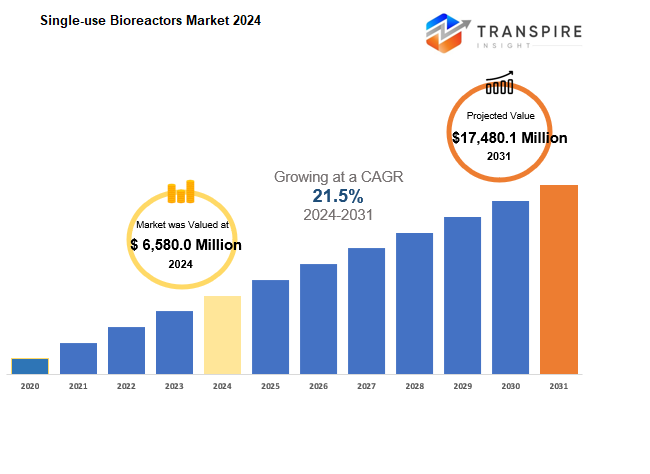
GROWTH FACTORS
The Global single-use bioreactors market is experiencing rapid growth driven by advancements in biopharmaceutical production processes. These systems offer advantages such as reduced initial investment costs and elimination of cleaning and sterilization expenses, making them an attractive option for cost-effective production methods for many biopharmaceutical companies. However, challenges exist, primarily concerning the environmental impact of plastic waste generated by single-use systems and limitations in handling high-volume bioprocessing. Despite these challenges, the market presents significant growth opportunities, particularly in emerging markets and small biotech companies where cost-effective production of biologics is gaining interest. Innovation in biodegradable materials and enhancements in design and capabilities of single-use systems are expected to address current challenges and drive further adoption. As the biopharmaceutical industry continues to evolve, single-use bioreactors will play a critical role in meeting the demand for efficient, flexible, and scalable production systems, driving significant innovations in biopharmaceutical manufacturing in line with global trends in sustainability and personalized medicine.
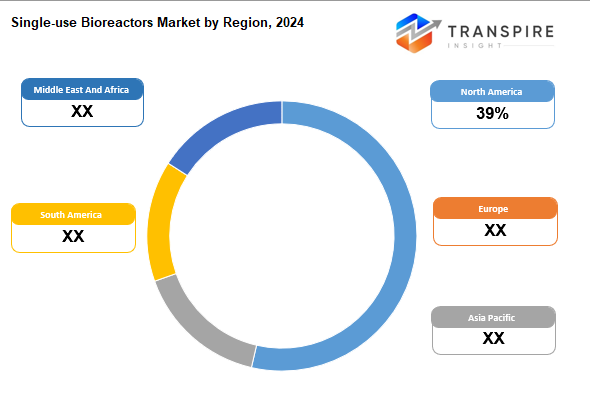
MARKET SEGMENTATION
By Product
The Global Single-use Bioreactors market is experiencing significant growth driven by the shift towards more efficient and sustainable bioprocessing solutions. Single-use bioreactors offer advantages such as convenience, cost-effectiveness, and flexibility over traditional stainless-steel systems, making them increasingly popular in industries focused on biopharmaceuticals, vaccines, and research applications. The market is segmented into various products, including Single-use Bioreactor Systems, Single-use Media Bags, Single-use Assemblies, all catering to the rising demand for streamlined production processes.
One of the key drivers of the Global Single-use Bioreactors market is the focus on reducing contamination risks and setup time. Companies are drawn to single-use bioreactors due to their elimination of extensive cleaning and sterilization processes, which helps in enhancing production efficiency. The versatility of these systems on both small and large scales is particularly appealing to the biotechnology and pharmaceutical industries, leading to a surge in demand for single-use solutions. Technological advancements are expected to further enhance the capabilities of single-use bioreactors, making them more environment-friendly and efficient in providing real-time monitoring and control systems for improved pharmaceutical production processes.
By Type
The global single-use bioreactors market is currently undergoing significant growth and evolution, driven by advancements in bioprocessing technology and the increasing demand for efficient and cost-effective solutions within the biopharmaceutical industry. Single-use bioreactors have emerged as a popular choice due to their flexibility, reduced risk of contamination, and lower operational costs compared to traditional stainless-steel bioreactors. With their benefits now recognized, SUBs are becoming essential in the production of vaccines, monoclonal antibodies, and other biotherapeutics, playing a crucial role in shaping the industry's trajectory.
Among the different types of single-use bioreactors, the stirred-tank bioreactors stand out for their versatility and ability to support various cell culture processes. These bioreactors have proven indispensable in pharmaceutical manufacturing, accommodating production at different scales and meeting the increasing demand worldwide. Additionally, wave-induced single-use bioreactors and bubble-column single-use bioreactors have gained prominence for their unique applications and efficiency in specialized processes, contributing to the market's growth and innovation. As the market continues to expand, the focus on personalized medicine and the adoption of biotherapeutics globally will further drive the development of efficient, scalable, and adaptable single-use bioreactors, revolutionizing healthcare delivery and pharmaceutical production on a global scale.
By Application
The Global Single-use Bioreactors market has seen remarkable growth due to the adoption of evolving technologies to meet increasing demands. Single-use bioreactors (SUBs) offer a cost-effective solution compared to traditional stainless-steel systems, mitigating contamination risks in the process. These attributes make SUBs ideal for bioproduction processes, research and development, and process development, positioning them as a key component in the ever-changing landscape of biotechnology and pharmaceutical production.
Bioproduction has greatly benefited from the implementation of single-use bioreactors, enabling easy scalability and rapid production adjustments without lengthy cleaning processes. With the growing demand for biologic therapies and vaccines, efficient production systems are essential. The use of SUBs accelerates development and manufacturing cycles, reducing production time while keeping operational costs low. Furthermore, in process development, single-use bioreactors offer flexibility in testing and optimizing production parameters, contributing to waste reduction and maximizing yield. These advantages solidify SUBs as a pivotal tool in shaping the future of industrial biotechnology.
By End User
The Global Single-use Bioreactors market is experiencing significant growth as industries look for more efficient and cost-effective methods for biopharmaceutical production. Single-use bioreactors have become essential in modern processes due to their one-time use nature and their ability to streamline bioprocessing operations. This market is divided into various end users, including pharmaceutical and biotechnology companies, contract manufacturing organizations (CMOs) and contract research organizations (CROs), as well as academic and research institutes. Each segment plays a unique role in the market's expansion, with pharmaceutical and biotechnology companies leading the way due to the high demand for biologics, vaccines, and other therapeutic products.
One of the key advantages of single-use bioreactors is their cost efficiency compared to traditional stainless-steel systems. These bioreactors require minimal cleaning and validation, allowing for shorter production timelines. As the market continues to evolve towards personalized medicines and advanced biologics, single-use bioreactors will remain at the forefront of biotechnology advancements. They are designed to simplify large-scale and small-batch production processes, catering to a wide range of therapeutic pipelines. Additionally, the market is also influenced by the presence of CMOs and CROs, which are essential partners for pharmaceutical companies lacking in-house manufacturing capabilities. By embracing new technologies, these organizations can provide high-quality and scalable solutions to meet the growing demand for biopharmaceutical products.
REGIONAL ANALYSIS
The worldwide Single-use Bioreactors market is a critical component of the modern biopharmaceutical production industry. The market is segmented into five major regions: North America, Europe, Asia-Pacific, South America, and the Middle East & Africa. Each region presents unique opportunities and challenges influenced by factors such as infrastructure, technological advancements, and demand for biopharmaceuticals.
North America leads the market due to its strong pharmaceutical sector and early adoption of new technologies. The U.S., Canada, and Mexico are investing in researching bioreactor technologies, with the U.S. leading in expertise and regulatory systems. In Europe, the UK, Germany, France, and Italy are key contributors to the market growth, focusing on sustainable manufacturing and flexible bioprocessing solutions. Asia-Pacific, with developing economies like India and China, shows significant market potential driven by increased healthcare requirements and government policies supporting biotechnology. South America, particularly Brazil and Argentina, is also showing interest in single-use bioreactors to strengthen its pharmaceutical industry. The Middle East & Africa are gradually adopting this technology, driven by improving healthcare systems and efforts to develop localized pharmaceutical production. Overall, the global Single-use Bioreactors market is set to mature with advancements in automation, environmental awareness, and cost-effective production, serving as a hub for biopharmaceutical innovation worldwide.
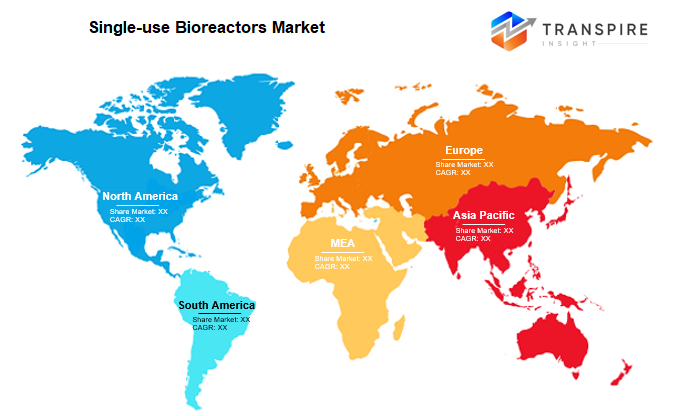
KEY INDUSTRY PLAYERS
The Global Single-use Bioreactors market is revolutionizing the biopharmaceutical production landscape by fostering innovation and enhancing efficiency. Utilizing disposable components, single-use bioreactors have become indispensable in the manufacturing of biologics, vaccines, and cell therapies. This approach minimizes the risk of contamination and streamlines production processes, leading to a surge in demand as biopharmaceutical companies strive for quicker developmental cycles and flexible manufacturing setups.
Leading the research and development in this sector are key players such as Sartorius AG, Thermo Fisher Scientific, and Merck KGaA, who continuously enhance product capabilities like scalability, automation, and compatibility with various cell culture applications. While Sartorius AG caters to large-scale manufacturing needs with innovative solutions, Thermo Fisher Scientific focuses on expanding its portfolio to meet the growing demand for precision and reliability. New entrants like PBS Biotech and Kühner AG contribute to market diversity by offering innovative bioreactors tailored for specific therapeutic applications, making advanced technologies accessible to both small-scale operations and the biomanufacturing sector. Established players like Eppendorf SE and Parker Hannifin Corporation have played a significant role in advancing cutting-edge materials and designs that drive the market's growth trajectory.
Moving forward, the Global Single-use Bioreactors market is poised for significant changes with the rise of Personalized Medicine and Advanced Therapies in the healthcare industry. The adaptability of single-use systems to varying production scales will be crucial in meeting the evolving healthcare needs. In terms of sustainability, players like Lonza and Saint-Gobain are expected to innovate further to minimize the environmental impact of disposable components. As more companies invest in expanding their bioproduction capabilities, the market is likely to see an influx of partnerships and collaborations aimed at enhancing the technical capabilities of single-use bioreactors, reducing costs, and making them more accessible to emerging biopharmaceutical firms. With the commitment of key players to advancing healthcare manufacturing technologies, the Global Single-use Bioreactors market is on track for dynamic growth, paving the way for a future industry characterized by efficiency and adaptability, offering abundant opportunities for both existing and new market participants.
REPORT SCOPE AND SEGMENTATION
|
Attributes |
Details |
|
Market Size By 2031 |
USD 17480.1 Million |
|
Growth Rate |
CAGR of 21.5% |
|
Forecast period |
2024 - 2031 |
|
Report Pages |
250+ |
|
By Type |
|
|
By Product |
|
|
By Application |
|
|
By End User |
|
|
By Region |
|
|
Key Market Players |
|



_page-0001.jpg)


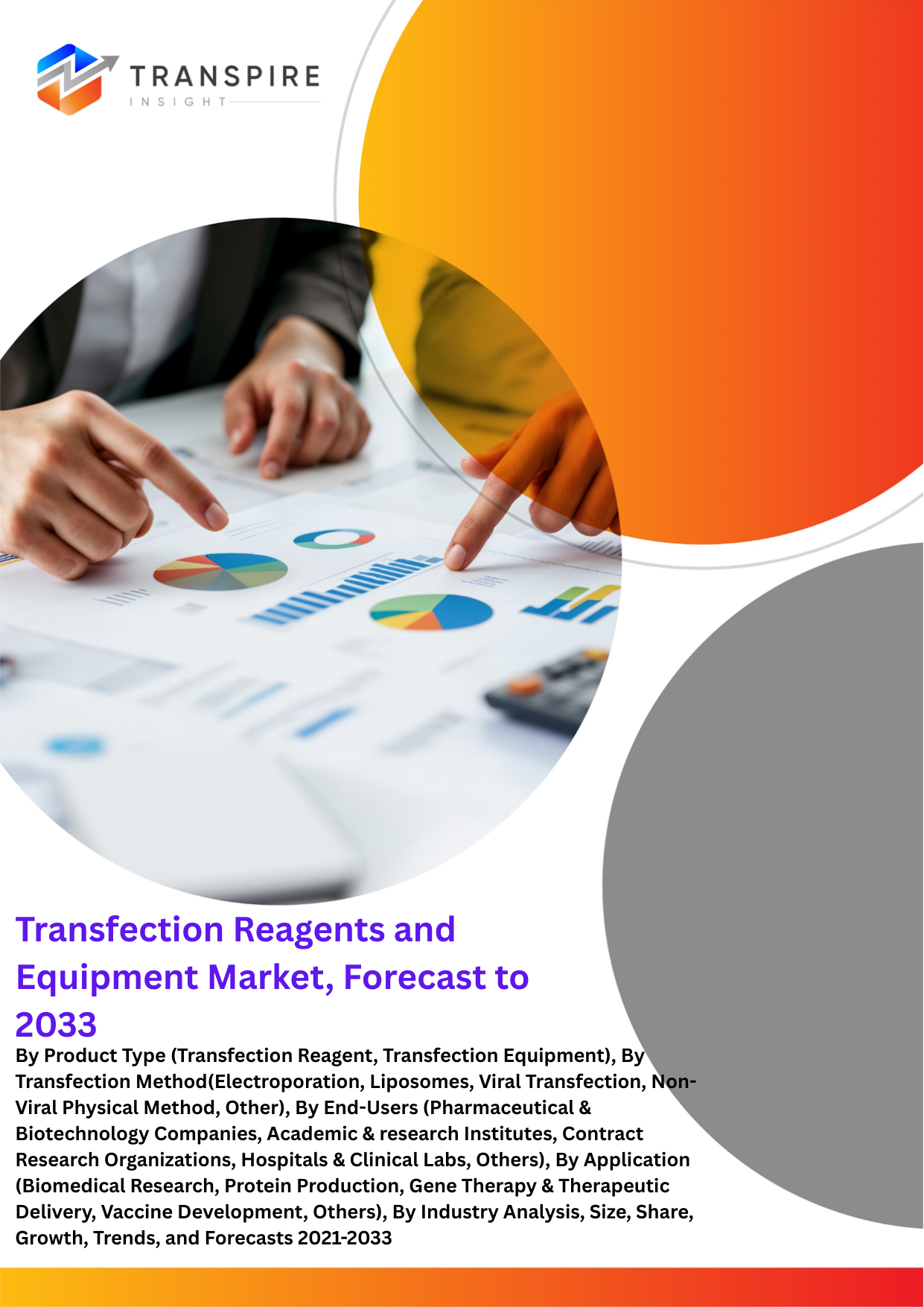
_page-00011.jpg)
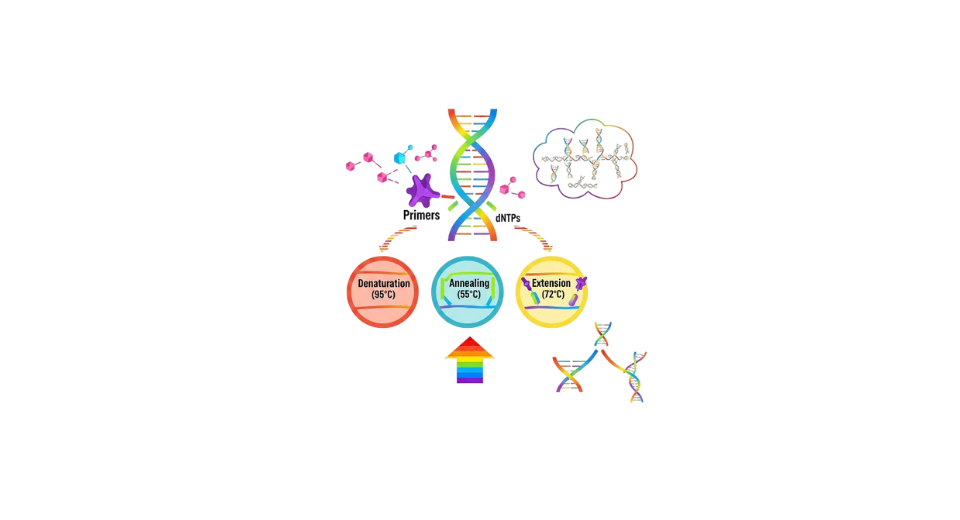
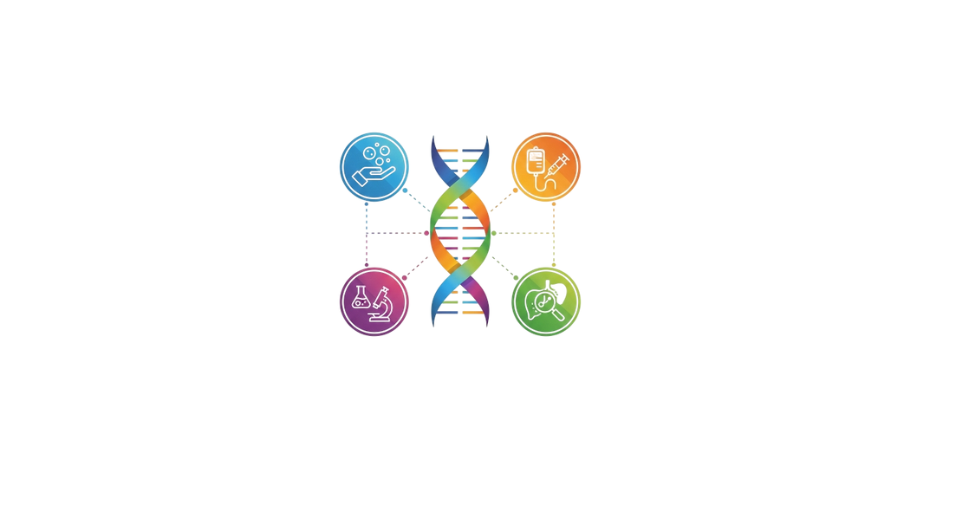
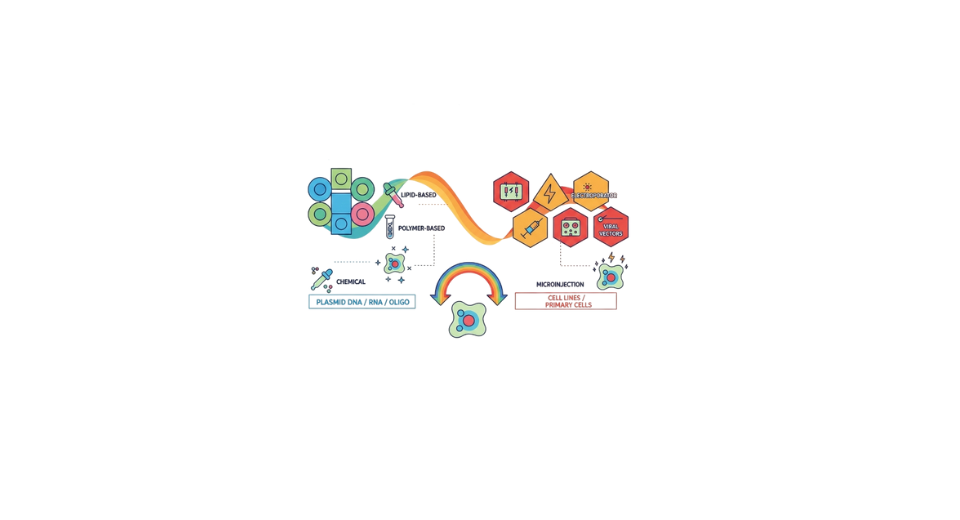



 APAC:+91 7666513636
APAC:+91 7666513636





